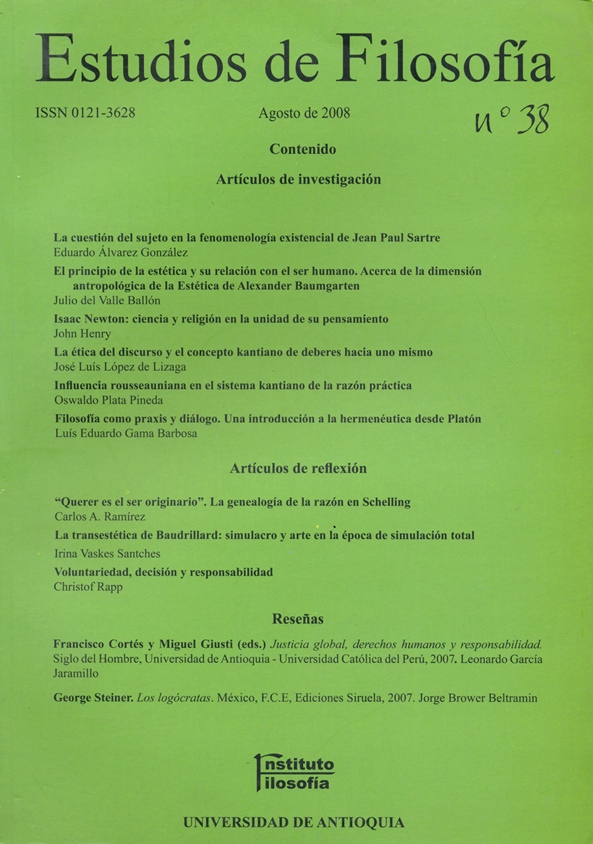“To want is the Original Being” [The Genealogy of Reason in Schelling]
DOI:
https://doi.org/10.17533/udea.ef.12702Keywords:
God, Reason, Act, Wanting, Original BeingAbstract
As the title well indicates, the present piece is directed to accounting for the genesis of Human Reason and this is achieved, in the first instance, through the analysis of the Idea of God, which according to Schelling, is the content of Human Reason, though because of this, He constitutes Himslef as something rational. It is precisely this rational character of God that constitutes the step from the absolute to Him, in other words, what Schelling terms the most primary form of the spirit. This search for the Genealogy of Reason is done, in the present text, in the books “Piece on Liberty” (1809) and in the different versions of “The Ages of the World” (1811-1815). In these texts there is an elaboration of the presence of German thinkers such as Kant and Fichte in Schelling ́s Thought and besides of the presence in it of concepts such as act, through which he tries to account in a better way for the so-called originary potency, that is, of wanting that which is called original being. Thus, through this analysis the conclusion is drawn that the potency is what is always thinkable which generates the thinking act. In regard to a Theory of Rationality this means the following: reason, whose ontologized form in God, spontaneously establishes itself but on a base which she has not established.
Downloads
References
ARISTÓTELES. Metafísica. Ed. Gredos, Madrid, 1988.
BUCHHEIM, T. Eins von Allem, Die Selbstbescheinung des Idealismus in Schellings Spätphilosophie. Felix Meiner Verlag, Hamburg, 1992. DOI: https://doi.org/10.28937/978-3-7873-4195-5
CARVALHO, J. "Reflexion und reflexibilität“. Fichte-Studien, N. 28. pp. 187-204. DOI: https://doi.org/10.5840/fichte20062868
DELEUZE, Gilles. Spinoza y el problema de la expresión. Muchnik, Barcelona, 1993.
FICHTE, J.G. Grundlage der gesamten Wissenschaftslehre. Felix Meiner Verlag, Hamburg, 1997.
FiCHTE, J.G. Sämmtliche Werke. herausgegeben von I. H. Fichte, 8 Bände, Berlin, Veit und Comp., 1845-46.
FRANK, M. Selbstgefühl. Eine historisch-systematische Erkundung. Suhrkamp, Frankfurt am Main, 2002.
FRANK, M. Das unendliche Mangel an Sein, Schellings Hegelkritik und die Anfängen der Marxschen Dialektik. Fink, München, 1992.
HOGREBE, W. Prädikation und Genesis. Metaphysik als Fundamentalheuristik im Ausgang von Schellings "Die Weltalter“. Suhrkamp, Frankfurt am Main, 1989.
JANKE, W. Fichte: Sein und Re exion – Grundlagen der kritischen Vernunft. Walter de Gruyter. Berlin. 1970. DOI: https://doi.org/10.1515/9783110847796
REINHOLD, K.L. Über das Fundament des philosophischen Wissens. Hrg. Von Wolfgang Schrader, Meiner, Hamburg, 1978.
SCHELLING, F. W. J. Grundlegung der positiven Philosophie. Münchener Vorlesungen WS 1.832/33 und SS 1.833. Torino, 1972, p. 222.
SCHELLING, F. W. J. Philosophie der Offenbarung. Suhrkamp, Franfurt, 1993.
SCHELLING, F. W. J. Sämtlichen Werken, hg. von K.F.A. Schelling, Stuttgart (Cotta) 1856-1861
SCHELLING, F. W. J. Weltalter Fragmente. Frommann-Holzboog Verlag, Stuttgart - Bad Cannstatt, 2002.
SCHULZ, W. Die Vollendung des deutschen Idealismus in der Spätphilosophie Schellings. Pfullingen, 1955.
Downloads
Published
How to Cite
License
Copyright (c) 2008 Estudios de Filosofía

This work is licensed under a Creative Commons Attribution-NonCommercial-ShareAlike 4.0 International License.
Authors who publish with this journal agree to the following terms:
1. The Author retains copyright in the Work, where the term "Work" shall include all digital objects that may result in subsequent electronic publication or distribution.
2. Upon acceptance of the Work, the author shall grant to the Publisher the right of first publication of the Work.
3. The Author shall grant to the Publisher a nonexclusive perpetual right and license to publish, archive, and make accessible the Work in whole or in part in all forms of media now or hereafter known under a Creative Commons Attribution-NoCommercia-ShareAlike (CC BY-NC-SA 4.0), or its equivalent, which, for the avoidance of doubt, allows others to copy, distribute, and transmit the Work under the following conditions: (a) Attribution: Other users must attribute the Work in the manner specified by the author as indicated on the journal Web site;(b) Noncommercial: Other users (including Publisher) may not use this Work for commercial purposes;
4. The Author is able to enter into separate, additional contractual arrangements for the nonexclusive distribution of the journal's published version of the Work (e.g., post it to an institutional repository or publish it in a book), as long as there is provided in the document an acknowledgement of its initial publication in this journal;
5. Authors are permitted, and Estudios de Filosofía promotes, to post online the preprint manuscript of the Work in institutional repositories or on their Websites prior to and during the submission process, as it can lead to productive exchanges, as well as earlier and greater citation of published work (see The Effect of Open Access). Any such posting made before acceptance and publication of the Work is expected be updated upon publication to include a reference to the Estudios de Filosofía's assigned URL to the Article and its final published version in Estudios de Filosofía.















